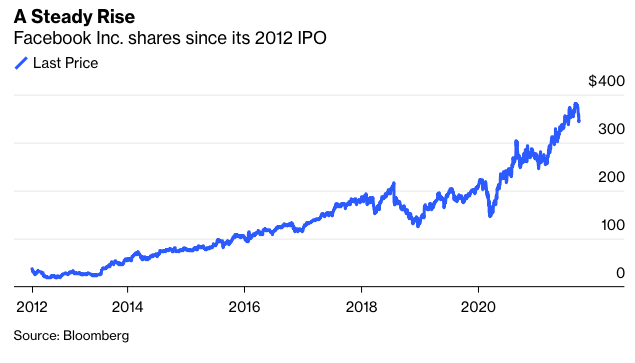For years Facebook Inc. stock has been a must own. The company enjoyed constant growth, regular user engagement and ad revenues that grew even with scandals tied to user data and fake news. But investors should be starting to worry a little.
Regulators have been given the tantalizing prospect of accessing internal documents that could bolster planned investigations into the company. Files leaked to the Wall Street Journal recently exposed troubling internal practices and some of the documents have been handed over to the U.S. Securities and Exchange Commission by a person seeking federal whistleblower protection.
Being bearish on Facebook is an unpopular view. Out of 58 equity analysts tracked by Bloomberg, only three recommend selling Facebook shares, and the average 12-month target is $418, almost $60 above the current price.

But Facebook’s reign as social media king is increasingly under threat from competitors such as ByteDance Ltd’s TikTok and even Apple Inc. The company’s innovations in virtual reality and smart glasses will never replicate the success of its ad business. (The departure of its chief technology officer last week doesn’t conjure much faith in future products, though his successor has a track record in hardware.) The shift toward investing based on environmental, social and governance performance may also hurt the company: ESG-focused funds have blacklisted Facebook for past controversies, and it currently has a riskier ESG score than Alphabet Inc.’s Google, Microsoft Corp. or Apple, according to Sustainanalytics. (Sustainanalytics, which rates listed companies based on their environmental, social and corporate governance performance, said Facebook’s ESG rating was currently under review following the recent WSJ reports, to determine if it warranted a downgrade.)
The biggest issues for Facebook, however, revolve around regulation, legislation and litigation—and it’s easy to see why the market hasn’t fully absorbed this. These risks are challenging to track. Here’s a breakdown of some key concerns, bearing in mind some may still be a year or two (or more) out.
Regulators are targeting Facebook’s structure. The Federal Trade Commission wants a court order forcing Facebook to sell Instagram and WhatsApp. U.S. lawmakers on both sides of the aisle are pushing for a breakup too. Instagram provides more than a quarter of the social media giant’s revenue, according to Bloomberg News, and is Facebook’s last link to the teens and twenty-somethings who have been gravitating away over the past decade.
There’s a push to change Facebook’s algorithms and internal systems. Legislators have become serious about pushing for systematic changes to Facebook’s recommendation algorithms, which have been accused of rewarding controversial content, but which also keep users coming back for more.
For instance, at the heart of two pending European Union and U.K. laws governing online safety are requirements that social media companies such as Facebook adjust their systems to stop algorithms from propagating harmful content. In other words, it may not be enough for the company to take down posts of revenge porn and hate speech in an endless game of whack-a-mole. It may instead have to rewrite the algorithms so that such content doesn’t make it into newsfeeds in the first place. That could hurt its ad business if it impacts engagement.
Facebook has already spent a lot—more than $13 billion—on safety and security efforts since 2016. And it pays for some 40,000 people, many of them contractors, to work on content issues. Europe’s new Digital Services Act, which requires further “risk management” measures, means the company will probably have to invest even more to improve content moderation.








